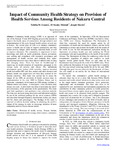Impact of Community Health Strategy on Provision of Health Services Among Residents of Nakuru Central

View/
Date
2015Author
Kwasira, Tabitha M.
Makindi, Stanley M.
Muchiri, Joseph
Metadata
Show full item recordAbstract
Community health strategy (CHS) is an approach of one of the Kenyan Vision 2030 flagship projects that intends to improve the health status of communities, through initiation and implementation of life-cycle focused health actions at level one in Kenya. The overall goal of CHS is to enhance community access to health care in order to improve productivity and thus reduce poverty, hunger, child mortality, maternal death, as well as improve education. The community is empowered to have knowledge and skills in health promotion, disease prevention, care seeking and compliance with treatment, governance and management of health services and claiming their rights. International initiatives have been taken to address both existing and emerging issues. There has been no breakthrough in improving the health situation of households entrapped in the vicious cycle of poverty and illness. The millennium development goals (reduce child mortality, improve maternal health and combat HIV and Aids, malaria and other diseases) and primary health care targets have not been fully realised in low income countries.: This study was carried out to assess the impact of the CHS on provision of health services since its implementation in the year 2009 in Nakuru, Kenya and in particular, community involvement on CHS among residents of Nakuru central sub county. A descriptive- cross sectional study design was used.. A pilot study was done to determine the clarity and consistency of the questions in the questionnaire. The study used both quantitative and qualitative data collection methods. The data was analyzed using descriptive and inferential statistics by use of the statistical package for the social sciences (SPSS) and described through frequency distributions (tables, pie charts and bar charts and percentages). The findings of the study is expected to inform decision making in enhancing the positive impact of the strategy in order to encourage initiation of more community units to reverse disease trends
